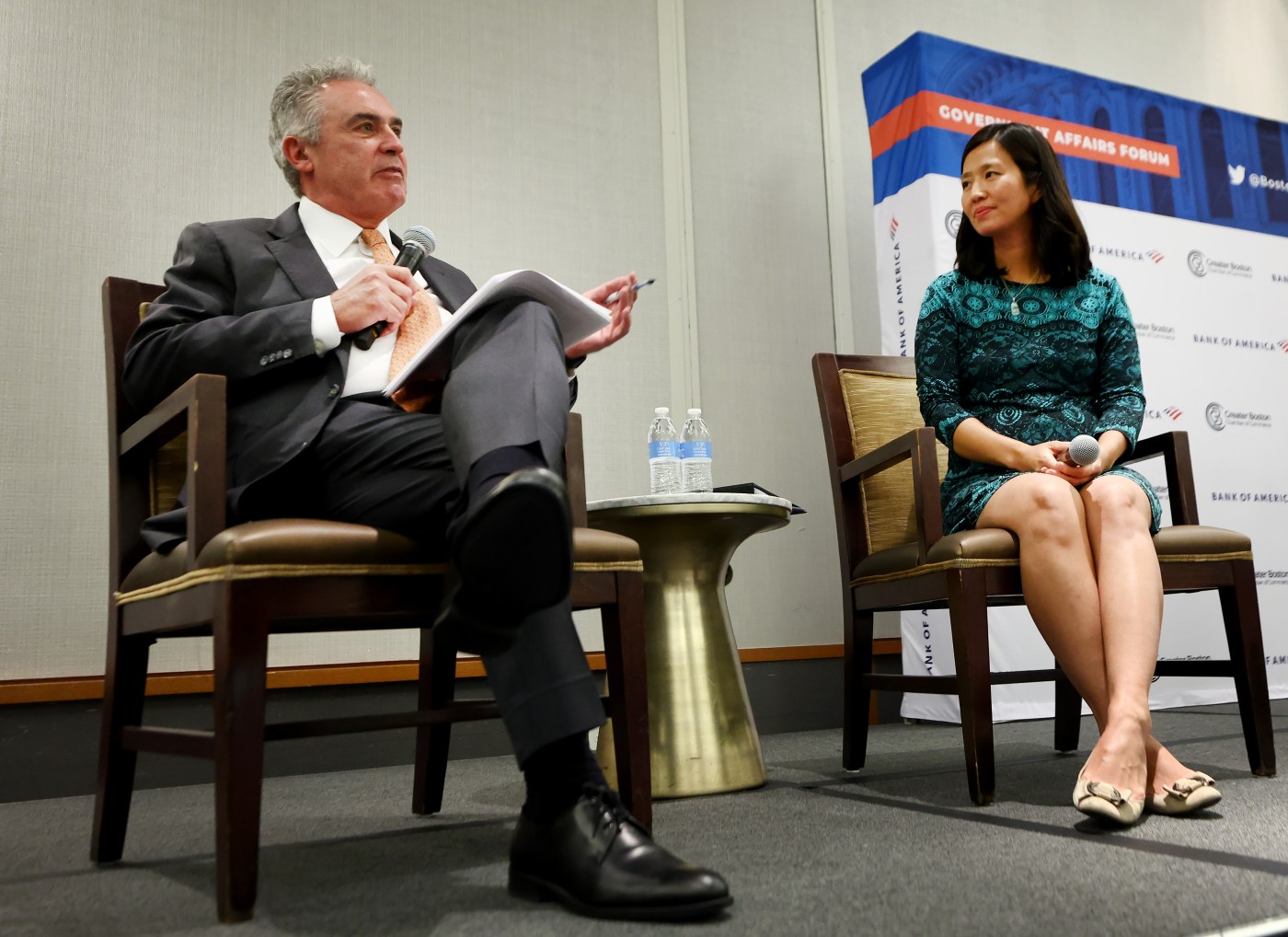
Boston business leaders considering backing out of tax compromise with Mayor Wu after less dire hikes
Four business stakeholders who withdrew their opposition to Boston’s plan to hike commercial tax rates are rethinking their compromise with the mayor, given the latest city data that show homeowners won’t be hit with a dramatic tax increase.
The October compromise was reached with the understanding that the mayor’s tax classification legislation would lower a projected 14% annual tax increase for the average single-family homeowner to about 9%, or one that was in line with the average hike over the past five years.
New city valuation data that started to be circulated by Mayor Michelle Wu’s office Wednesday night, after certification from the state Department of Revenue, showed that was no longer the case.
The legislation, per a Thursday letter Wu sent to the Senate, where the bill was blocked again by South Boston Democrat Sen. Nick Collins, would lower the annual tax spike for homeowners to about 5%. Should the bill fail, homeowners would see a year-over-year tax increase in line with prior years, or about 10%.
A statement issued Thursday by the Boston Municipal Research Bureau, Greater Boston Chamber of Commerce, NAIOP and the Massachusetts Taxpayers Foundation expressed support for the Senate delay to digest the new data, and appeared to indicate the groups were rethinking their prior compromise — which was facilitated, in part, at the direction of Senate President Karen Spilka.
“The new property valuations certified by the Department of Revenue last night materially differ from the data provided by the city in discussions in October,” the four groups’ statement said. “Based on these revised figures, we support pausing consideration of Boston’s home rule petition that would shift property taxes onto commercial property owners to allow time to analyze the impact of the new information.
“With this new data, we understand that residential taxes for the average single-family homeowner would increase by 10.5% in fiscal year 2025 if the legislation does not pass,” the statement continued. “This increase would be in line with the increases in the past five years and would also ensure stability for the commercial real estate industry during this challenging time.”
Marty Walz, interim president of the Boston Municipal Research Bureau, called upon the relevant stakeholders to determine whether the bill is still necessary.
“All stakeholders need to assess whether the home rule petition is necessary or if there is a different path forward that protects the most vulnerable residential taxpayers, while avoiding the negative consequences of a tax increase on a struggling commercial sector,” Walz said in a statement to the Herald.
The Boston Municipal Research Bureau, a fiscal watchdog group that keeps an eye on City Hall finances, while agreeing to the prior compromise, did so with criticism that the city should look to limit future budget growth.
The mayor, while proposing a commercial tax rate increase beyond the state limit, had rejected calls to cut a $4.6 billion budget that grew by 8% this fiscal year, calling such suggestions “fiscally irresponsible.”
Changing post-pandemic work patterns have led to vacant office space and falling commercial property values that the mayor had initially anticipated would shift a higher amount of the city’s tax burden to residents.
Collins had delayed a Senate vote on the mayor’s tax bill on Monday, in part, because he was awaiting certified valuation data from the city that he was expecting to emerge during a City Council hearing held Tuesday.
Instead, the city’s assessing commissioner Nicholas Ariniello refused to provide councilors with the data, while at the same time requesting that they vote to set tax rates, which are contingent on the valuation data and subject to change depending on whether the Senate approves the mayor’s tax legislation.
Collins, while blocking the bill for a second time during Thursday’s Senate session, expressed the need for more time to digest the data, which he said was “far off” from earlier estimates from the city, “to determine if this home rule is necessary.”
“What are we trying to accomplish?” Collins told reporters, asking if the bill was meant to “stave off” that “the sky is falling.”
Now, he said, “We realize the sky’s not falling.”
He had also stated earlier this week that city officials indicated at the Council hearing that “they anticipate a surplus from the new valuations,” funds that he said should be “directed toward residential tax relief, particularly for our seniors.” The mayor’s office said Ariniello did not commit either way to a surplus at the hearing.
Related Articles
South Boston Democrat blocks Michelle Wu’s tax shift bill in Senate for second time
Battenfeld: Fernandes Anderson brings yet more scrutiny to Boston City Council
Boston Mayor Michelle Wu launches free museums for all city children after criticism
North End’s ‘war’ against Boston Mayor Michelle Wu reaches federal court with hearing set
Boston City Council reaffirms sanctuary status to ‘brace for impact’ of Trump mass deportation vow
Wu’s office did not immediately respond to a request for comment on the hedging from the four business stakeholders, but had stated in her letter to the Senate that the “legislation is necessary to stabilize tax bills across both sectors and prevent potential worst-case scenarios over the next three years.”
Should the business stakeholders opt to back out of the compromise, it may impact the bill’s prospects in the Senate, where a prior version of the tax plan stalled last summer, according to remarks from state Sen. Susan Moran, co-chair of the Legislature’s Joint Committee on Revenue.
Moran, a Falmouth Democrat, said she wants the four business groups to take the weekend to discuss the proposal with the mayor and state senators, “to see where there might be some area of progress” ahead of the next Senate session on Monday.
“(The business groups) have all told the mayor they do want to pause now, whether that’s for additional information that is expected to come out or whether that might be for the mayor to take a look at expenses,” Moran told the Herald.
Moran said she is also concerned that Wu’s proposal sets a precedent for other municipalities to bypass Proposition 2 1/2, a state law that limits the amount of property tax revenue cities and towns can raise.


